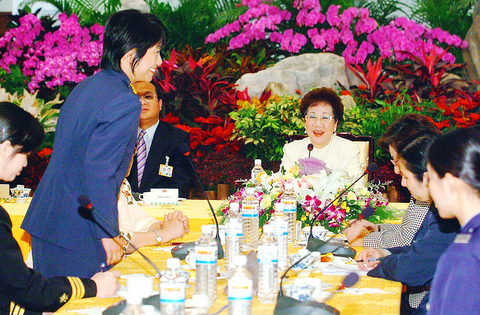Vice President Annette Lu (呂秀蓮) yesterday expressed the hope of seeing a female defense minister in the near future as the military now allows women to enlist in the nation's armed services.
"We have not yet seen a female deputy defense minister in Taiwan's modern history, while more than 10 countries in the world have had female defense ministers and 12 countries have had female leaders," Lu said. "I'd like to see more women participate in the decision-making process on all levels and write `herstory.'"
Lu made the remarks yesterday afternoon at the Presidential Office while holding an afternoon tea party for 26 female military officers. Among the attendees were Major-General Pan Ai-chu (潘愛珠) and General Chai Hui-chen (柴惠珍).

PHOTO: SUNG CHIH-HSIUNG, TAIPEI TIMES
Pan was the first Taiwanese woman to be promoted to the rank of major-general in more than 40 years of Taiwanese military history. She has been involved in analyzing Chinese military intelligence since joining the Military Intelligence Bureau (MIB) more than 20 years ago and was promoted to director of the MIB's mainland affairs research department in November 2001.
Late starter
Chai, a graduate of National Taiwan University's Horticulture Department, did not begin her military career until after she was admitted to the National Defense Medical College's Graduate Institute of Biochemistry.
With expertise in information-technology hardware and anti-virus computer software, Chai was promoted to the rank of general last month.
With Lu and Vice Minister of National Defense Ko Cheng-heng (柯承亨) looking on, the female guests appeared shy, with only a few of them daring to speak. Lu encouraged them to "stand up, speak up and step out" as modern women.
8,200 females
There are currently about 8,200 female members in the armed forces, all of them commissioned or non-commissioned officers who graduated from the nation's military academies.
The number of females serving in the nation's military is expected to rise following the passage of amendments to the Military Service Law (兵役法) last November which allow women interested in joining the military to enlist without having to first graduate from a military academy.

A preclearance service to facilitate entry for people traveling to select airports in Japan would be available from Thursday next week to Feb. 25 at Taiwan Taoyuan International Airport, Taoyuan International Airport Corp (TIAC) said on Tuesday. The service was first made available to Taiwanese travelers throughout the winter vacation of 2024 and during the Lunar New Year holiday. In addition to flights to the Japanese cities of Hakodate, Asahikawa, Akita, Sendai, Niigata, Okayama, Takamatsu, Kumamoto and Kagoshima, the service would be available to travelers to Kobe and Oita. The service can be accessed by passengers of 15 flight routes operated by

MORE FALL: An investigation into one of Xi’s key cronies, part of a broader ‘anti-corruption’ drive, indicates that he might have a deep distrust in the military, an expert said China’s latest military purge underscores systemic risks in its shift from collective leadership to sole rule under Chinese President Xi Jinping (習近平), and could disrupt its chain of command and military capabilities, a national security official said yesterday. If decisionmaking within the Chinese Communist Party has become “irrational” under one-man rule, the Taiwan Strait and the regional situation must be approached with extreme caution, given unforeseen risks, they added. The anonymous official made the remarks as China’s Central Military Commission Vice Chairman Zhang Youxia (張又俠) and Joint Staff Department Chief of Staff Liu Zhenli (劉振立) were reportedly being investigated for suspected “serious

Taiwanese and US defense groups are collaborating to introduce deployable, semi-autonomous manufacturing systems for drones and components in a boost to the nation’s supply chain resilience. Taiwan’s G-Tech Optroelectronics Corp subsidiary GTOC and the US’ Aerkomm Inc on Friday announced an agreement with fellow US-based Firestorm Lab to adopt the latter’s xCell, a technology featuring 3D printers fitted in 6.1m container units. The systems enable aerial platforms and parts to be produced in high volumes from dispersed nodes capable of rapid redeployment, to minimize the risk of enemy strikes and to meet field requirements, they said. Firestorm chief technology officer Ian Muceus said

Alain Robert, known as the "French Spider-Man," praised Alex Honnold as exceptionally well-prepared after the US climber completed a free solo ascent of Taipei 101 yesterday. Robert said Honnold's ascent of the 508m-tall skyscraper in just more than one-and-a-half hours without using safety ropes or equipment was a remarkable achievement. "This is my life," he said in an interview conducted in French, adding that he liked the feeling of being "on the edge of danger." The 63-year-old Frenchman climbed Taipei 101 using ropes in December 2004, taking about four hours to reach the top. On a one-to-10 scale of difficulty, Robert said Taipei 101